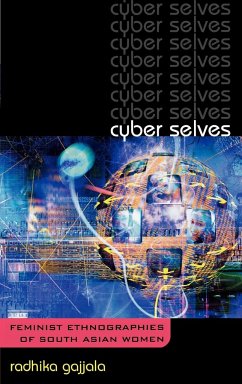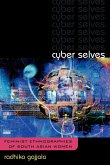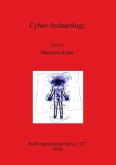In her new book Gajjala addresses the political, economic, and cultural ramifications of the explosion of Internet communication. She has developed a cyberethnography_based on case studies with email discussion lists such as the South Asian Women's list, the third-world-women list, the women-writing-culture list and the sa-cyborgs list_which examines the issues these lists raise regarding discursive production within an intellectual power field. This book will be a valuable reference for those with an interest in ethnographic methods, cultural studies, feminist studies, and new technologies.
Hinweis: Dieser Artikel kann nur an eine deutsche Lieferadresse ausgeliefert werden.
Hinweis: Dieser Artikel kann nur an eine deutsche Lieferadresse ausgeliefert werden.
Radhika Gajjala's Cyberselves asks all the essential questions about technology, diaspora, nationality, and gender in the age of the Internet. Her lyrical interventions into the form of the academic book disrupt expectations about what ethnography ought to look like, and her unusual perspective as a member and leader of early online community gives the book a welcome grounding in lived experience. Her earnest, passionate, and deeply felt intervention into cyberculture studies is grounded in an excellent knowledge of the most relevant theoretical debates regarding postcolonialism, gender, and technology. This book also includes an exciting dialogue with a South Asian women's labor activist, and is committed throughout to collaborative thinking and knowledge-creation. This is a very personal and intimate book, and a welcome addition to the existing body of literature on online ethnography. -- Lisa Nakamura, University of Wisconsin, Madison This probing and thoughtful work begins by addressing the politics of enunciation within diasporic cyberspaces, illustrating the kinds of complicities and resistances that get articulated through the struggle for control over meaning-making in such spaces. The book concludes by challenging us to think about how internet technologies could be redesigned to enable a truly dialogic exchange across gender, race, class and geographic location. -- Jyotsna Vaid, founding member of Committee on South Asian Wo, Texas A&M University Using cyber-ethnographic methodology and feminist theoretical framwork, [Gajjala] has studies the structure and content of exchanges among paricipants (netizens) in these virtual communities to answer fundamental questions about virtual communities...Theauthor's critical and reflective analysis challenges students of feminist studies and of online communication studies to reconsider the assumption that internet communication in the globalized world is a power equalizerrrr Electronic Magazine Of Multicultural Education ...an intriguing study... H-Net: Humanities and Social Science Reviews Online, February, 2008 ...insightful. It highlights several important issues, not only online practices that lead to an 'insider' becoming an 'outsider', but more importantly women only spaces on the Web. Indian Journal Of Gender Studies Gajjala's book is uniquely personal, uniquely insightful, and uniquely provocative. It adds new and important dimensions to the study of identity, race, and communication, on the internet as well as in the world offline. -- Steve Jones, University of Illinois at Chicago Using cyber-ethnographic methodology and feminist theoretical framwork, [Gajjala] has studies the structure and content of exchanges among paricipants (netizens) in these virtual communities to answer fundamental questions about virtual communities...The author's critical and reflective analysis challenges students of feminist studies and of online communication studies to reconsider the assumption that internet communication in the globalized world is a power equalizer Electronic Magazine Of Multicultural Education








